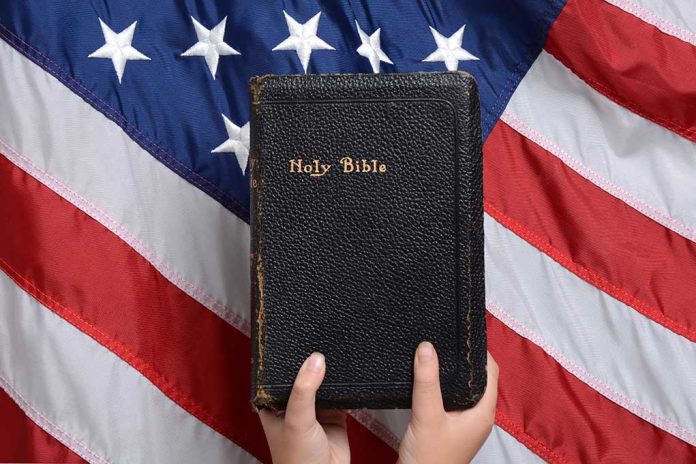
Texas education officials have endorsed a new elementary school curriculum that includes Biblical content, sparking controversy and debate.
At a Glance
- Texas State Board of Education approved a curriculum with Biblical material for elementary schools.
- The optional curriculum has led to protests and debates over church-state separation.
- This move aligns with broader conservative efforts to connect U.S. history and politics to Christian values.
- Texas is at the forefront of expanding religion’s role in public schools.
- The curriculum could potentially serve as a model for other states.
Texas Approves Bible-Infused Curriculum
The Texas State Board of Education has taken a controversial step by endorsing a new elementary school curriculum that incorporates Biblical material into reading and language arts lessons. This decision, while preliminary with a final vote expected soon, has ignited a fierce debate over the role of religion in public education. The curriculum, which is optional for schools to adopt, has become a focal point for discussions about the separation of church and state in the classroom.
This move by Texas education officials is seen as part of a larger trend in the state to expand the role of religion in public schools. Texas has been at the forefront of such initiatives, being the first state to allow public schools to hire religious chaplains as counselors. Additionally, efforts are underway to mandate the display of the Ten Commandments in classrooms, further blurring the lines between religious and secular education.
A majority of the Texas State Board of Education signaled their support Tuesday for a state-authored curriculum under intense scrutiny in recent months for its heavy inclusion of biblical teachings.
— WFAA (@wfaa) November 19, 2024
Implications and Reactions
The decision has garnered both support and criticism from various quarters. Advocates of religious freedom view this curriculum as part of a broader conservative effort to connect U.S. history and politics to Christian values. They argue that such content offers moral insights and enhances students’ cultural learning experience. On the other hand, critics express concern about the potential infringement on the principle of separation of church and state, worrying that it may impose a specific religious perspective on students within a supposedly secular educational framework.
The implications of this decision extend beyond Texas. As a state often seen as a trendsetter in educational policy, there is speculation that this curriculum could serve as a model for other states. This has led to increased scrutiny and debate about the appropriate balance between religious content and secular education in public schools across the nation.
National Context and Political Alignment
The Texas Board of Education’s decision aligns with the incoming Trump administration’s commitment to support the conservative Christian movement. This initiative is part of a larger pattern of schools becoming battlegrounds for debates over Christian values in public life. Similar efforts have been observed in other states such as Oklahoma and Louisiana, indicating a broader national trend.
As the debate continues, educators, parents, and policymakers grapple with the challenge of balancing religious representation in educational content with the needs of a diverse student population. The ongoing discussion highlights the complexity of curriculum development in a society with varied religious and cultural backgrounds, raising important questions about the role of religion in public education and the boundaries of church-state separation in the modern era.
Sources:
- Texas Ed. Board Votes to Keep ‘Bible-Infused’ Curriculum
- Texas Education Board Backs Curriculum With Lessons Drawn From Bible















